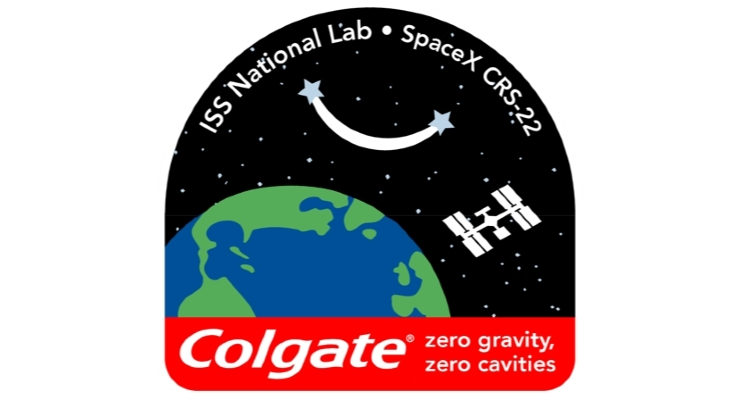Charles Sternberg, Assistant Editor05.27.21
Colgate-Palmolive (Colgate) is going to space—and it’s sending an oral care experiment to the International Space Station (ISS) under the sponsorship of the ISS U.S. National Laboratory (National Lab).
Colgate designed the experiment to learn more—in a unique microgravity environment—about the bacteria that affect oral and overall health. The experiment will travel to the orbiting laboratory aboard SpaceX’s 22nd commercial resupply services mission (SpaceX CRS-22), contracted by NASA, in the Dragon spacecraft launching no earlier than June 3, 2021 from Kennedy Space Center, FL.
“We constantly strive to push the limits of research and development - and now we’re pushing even further, into space,” said Pat Verduin, chief technology officer at Colgate-Palmolive. “Our unique partnership with ISS National Lab and the University of Nevada - Las Vegas will help us go beyond what’s expected, beyond what’s known and even beyond our planet to test and accelerate the science of oral health.”
About the Experiment in Space
The on-board experiment is designed to learn more about the growth and metabolism of oral biofilms, which in our mouths take the form of dental plaque that can lead to cavities and gum disease. To conduct the experiment on the ISS, the crew will use microfluidic devices developed by faculty from the College of Engineering at UNLV and Colgate’s microbiologists to simulate bacterial growth on a tooth-like surface. After more than a month of exposure to microgravity, the devices will be returned to Earth aboard the SpaceX Dragon spacecraft, and Colgate’s scientists will analyze and compare results to matching control experiments conducted on the ground.
“This upcoming SpaceX mission to resupply the space station with critical supplies also includes research that brings value to our nation and enables a robust market in low Earth orbit,” said Dr. Michael Roberts, interim chief scientist on behalf of the ISS National Lab. “We welcome Colgate to the space station research community, and hope this is the first of many successful investigations launched by the company’s scientists to the unique environment of the orbiting laboratory.”
Discovering New Ways to Fight Disease and Cavities
The company anticipates that the results of the mission could benefit more than half of the world’s population in the next five to ten years, as Colgate looks for new-found ways to create more effective therapies to fight disease, cavities, and anything that threatens oral and overall health.
This is the first of several research projects in space that Colgate has planned in partnership with the ISS National Lab.
“This is one small step towards advancing oral health, and one giant leap towards furthering Colgate’s research and development centered around smart health solutions,” said Verduin.
Last year, Estée Lauder sent its Advanced Night Repair Serum to the ISS.
Colgate designed the experiment to learn more—in a unique microgravity environment—about the bacteria that affect oral and overall health. The experiment will travel to the orbiting laboratory aboard SpaceX’s 22nd commercial resupply services mission (SpaceX CRS-22), contracted by NASA, in the Dragon spacecraft launching no earlier than June 3, 2021 from Kennedy Space Center, FL.
“We constantly strive to push the limits of research and development - and now we’re pushing even further, into space,” said Pat Verduin, chief technology officer at Colgate-Palmolive. “Our unique partnership with ISS National Lab and the University of Nevada - Las Vegas will help us go beyond what’s expected, beyond what’s known and even beyond our planet to test and accelerate the science of oral health.”
About the Experiment in Space
The on-board experiment is designed to learn more about the growth and metabolism of oral biofilms, which in our mouths take the form of dental plaque that can lead to cavities and gum disease. To conduct the experiment on the ISS, the crew will use microfluidic devices developed by faculty from the College of Engineering at UNLV and Colgate’s microbiologists to simulate bacterial growth on a tooth-like surface. After more than a month of exposure to microgravity, the devices will be returned to Earth aboard the SpaceX Dragon spacecraft, and Colgate’s scientists will analyze and compare results to matching control experiments conducted on the ground.
“This upcoming SpaceX mission to resupply the space station with critical supplies also includes research that brings value to our nation and enables a robust market in low Earth orbit,” said Dr. Michael Roberts, interim chief scientist on behalf of the ISS National Lab. “We welcome Colgate to the space station research community, and hope this is the first of many successful investigations launched by the company’s scientists to the unique environment of the orbiting laboratory.”
Discovering New Ways to Fight Disease and Cavities
The company anticipates that the results of the mission could benefit more than half of the world’s population in the next five to ten years, as Colgate looks for new-found ways to create more effective therapies to fight disease, cavities, and anything that threatens oral and overall health.
This is the first of several research projects in space that Colgate has planned in partnership with the ISS National Lab.
“This is one small step towards advancing oral health, and one giant leap towards furthering Colgate’s research and development centered around smart health solutions,” said Verduin.
Last year, Estée Lauder sent its Advanced Night Repair Serum to the ISS.




























